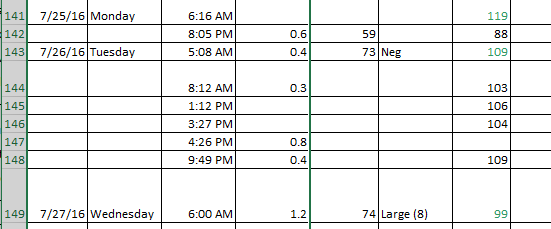First, most people who measure tend to do it once a day. Don’t stress over the readings, since they will vary. You probably had a bad strip, the time you mention in your first post. Just pick a time of day and be consistent. The cleanliness of the finger you prick for a blood measurement can affect the reading. A lot of people don’t measure ketones at all, since if our carbohydrate intake is low enough and we are still breathing in and out, our liver has to be making ketones.
Now, as for whether to count total or net carb intake, that is something you are going to have to determine for yourself. The idea behind net intake is that fibre is indigestible and therefore need not be considered. However, the experts vary.
On the Ketogenic Forums, we recommend an upper limit of 20 g/day, but leave it up to you whether to count net or total. Dr. Stephen Phinney at Virta Health gives patients a limit of 50 g/day total, in the hope (as he has stated) that their net intake will be under 20 g. Dr. Eric Westman gives his patients a strict limit of 20 g total and said in at least one lecture I’ve watched that there is evidence to suggest that fibre may not be as indigestible as we have heretofore thought. Some of the old weight-loss diets before the current nutritional dogma took hold told people to avoid sugar, grains, and starches, but allowed unlimited amounts of leafy greens, etc. The diet that worked for William Banting in the 1850’s (described in his Letter on Corpulence) would look a bit high-carb today, but it worked for him.
The key point, no matter what the diet, is to lower carbohydrate intake sufficiently to avoid a chronically elevated serum insulin level, since that way, we are avoiding damage from hyperglycaemia and hyperinsulinaemia. Measuring ketones is an indirect way of ensuring that insulin is low, since elevated serum insulin inhibits ketogenesis in the liver. But this way of eating is not solely about avoiding elevated insulin, it is also about the hormonal and nutritional benefits of the three ketone bodies (acetone, acetoacetate, and β-hydroxybutyrate). They not only serve as useful alternative fuels to various organs (especially the brain and the heart), but they also have epigenetic effects that promote health and well-being.
ETA: Caloric intake is less relevant when we give the body the proper food, since the hormonal response determines what happens with that food. The metabolism speeds up, under the right circumstances, and although a ketogenic diet involves eating more fat than the standard diet does, increased fatty-acid metabolism results in more fat-burning, not less, particularly when we give our body enough food for it to feel safe shedding some of its reserves. The idea is not to restrict calories intentionally, but to let our appetite guide us to how much to eat. When we have excess fat to shed, the caloric restriction will occur naturally, as the appetite hormones do their proper job (since insulin is no longer high enough to interfere).

 I have several engineering degrees and have been a scientist since as early as I can remember. I have thousands of samples in a spreadsheet. The samples include blood glucose (5 meters), ketones (4 blood ketone meters, 1 breath ketone meter, urine strips), etc. I have tried to test all kinds of theories: what does protein do to ketones? fat? carbs?
I have several engineering degrees and have been a scientist since as early as I can remember. I have thousands of samples in a spreadsheet. The samples include blood glucose (5 meters), ketones (4 blood ketone meters, 1 breath ketone meter, urine strips), etc. I have tried to test all kinds of theories: what does protein do to ketones? fat? carbs?